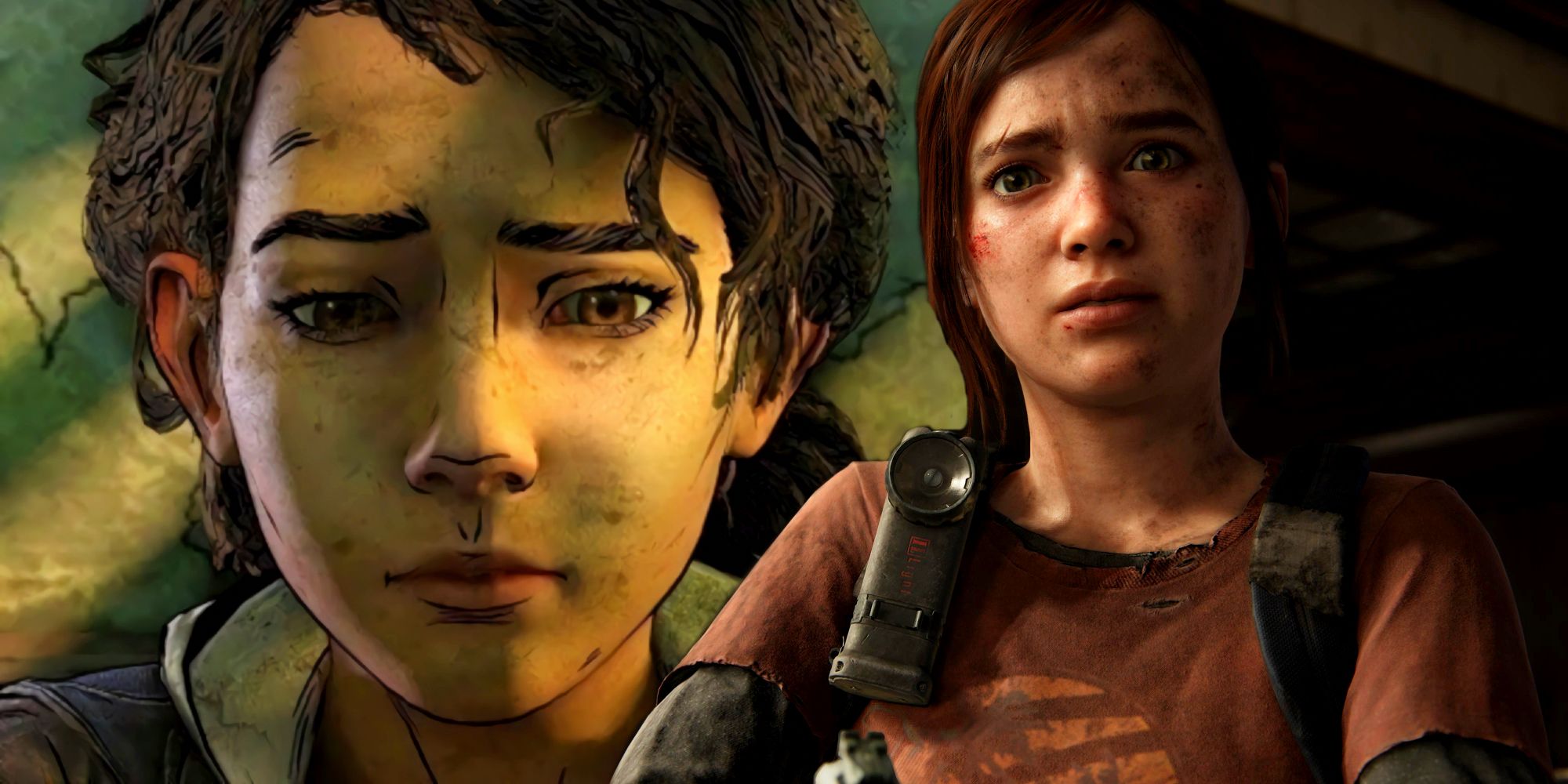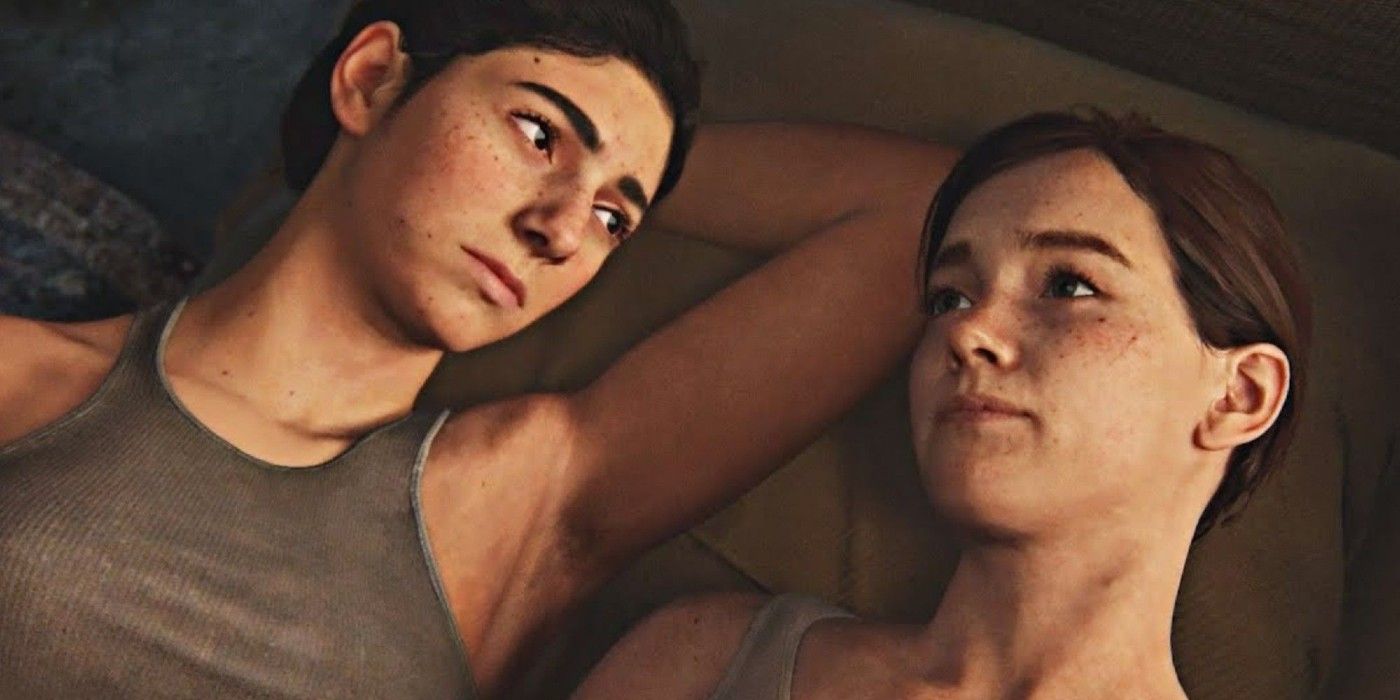The prior two generations of consoles saw a pair of remarkably similar heroines emerging as fan favorites, with Clementine from Telltale’s The Walking Dead game series and Ellie from Naughty Dog’s The Last of Us titles. Each of these characters grew up in post-apocalyptic worlds, Clementine in the zombie-overrun setting of Image Comics’ The Walking Dead series, and Ellie in a world devastated by the fungal Cordyceps brain infection which turns humans into zombielike creatures. Both had surrogate father figures who taught them survival skills and shaped their outlook on the world. Those men were their respective series’ original playable characters, as well, since the first of Telltale’s The Walking Dead games centered on Lee, Clementine’s guardian, and the original The Last of Us on Joel, Ellie’s adoptive parent.
[Warning: This article contains spoilers for The Last of Us and The Walking Dead.]Though the first game of Telltale’s Walking Dead was a Left 4 Dead spinoff in its original planning stages, the world of the comic series provided a better fit for the developer’s writing style. As fans of the TWD comic and its television series adaptation are aware, much of the series’ drama comes from the choices made by human survivors. Weighing ethical and tactical decisions and showing the good and bad outcomes of those choices is a key element of Walking Dead drama, far more so than any action sequences. The branching narrative style that became Telltale’s signature proved an ideal match for Walking Dead. Though the original protagonist of Lee is a fondly remembered character, his death is unavoidable in the first game, and the rest of the series follows Clementine.
Lee was serving a prison sentence for murder when the events of the zombie apocalypse led to his freedom. Many people are shown resorting to terrible acts to survive in a zombie outbreak. At age 52, Joel in The Last Of Us had become a hardened cynic, with many more murders burdening his conscience than Lee. Both Lee and Joel took young girls under their wing in part as acts of atonement. They imparted lessons about how to survive in a cruel and uncaring world. Lee and Joel also passed on unintended lessons on human interaction that would shape the girls as they grew to become young women, and the new protagonists in subsequent games.
Clementine Protects A.J. In The Walking Dead, Ellie Abandons J.J. In The Last Of Us Part 2
Beyond their similar backstories, some shared traits between Clementine and Ellie are variable, since players who completed Telltale’s The Walking Dead series were able to shape many of Clementine’s key decisions. Players could certainly choose romantic or vengeful options that make Clementine mirror Ellie, in many cases. Looking solely at the mandatory story elements, the differences between the two stand out more, however. Clementine protects and nurtures a boy named A.J. just as Lee protected her. It was clear from early trailers that The Last of Us 2 was about revenge, with no player options to divert that narrative and avoid a cycle of needless bloodshed. Ellie is shown as an adoptive mother to her girlfriend Dina’s son J.J. for a short time, but she abandons that familial relationship to avenge Joel.
Both girls were raised by strong surrogate father figures who were taken from them too early in life. Each of them later became a guardian to a boy (and those boys happen to have similar initial-based monikers). Focusing only on the mandated elements of The Walking Dead series’ story, the key difference is in their priorities. Clementine lost Lee earlier in life, and he died due to the bite of a zombie (although the player could determine if Clementine granted Lee a mercy killing or allowed him to turn). Joel was killed by Abby, and some fans viewed TLOU 2 as Team Ellie vs Team Abby instead of a commentary on the futility of revenge and an interrogation of the notion of justice.
Ellie abandoned J.J. and her relationship with Dina to pursue revenge, where Clementine never abandons A.J., no matter how hard things become. The final chapter of Telltale’s multipart saga ended on a hopeful note, as Clementine and A.J. found a new place to call home in Ericson’s boarding school, and the troubled-youth-turned-survivors residing there became their new family. Many players also ended the series with Clementine in a romantic relationship with either Violet or Louis. The Last of Us 2 ends with Ellie broken and alone, as Dina and J.J. are not waiting for her when she returns from her misguided revenge mission.
Ellie Valued Joel More Than His Lessons In The Last Of Us, Walking Dead's Clementine Followed Lee's Example
Whether these differences are due to the lessons imparted by Lee and Joel, or other influences that conditioned these series’ protagonists, their priorities clearly set them apart. Dina deserved better than Ellie in TLOU 2, but Ellie valued vengeance more than protecting her remaining loved ones. Though dependent on player choices, there were certainly opportunities to portray Clementine as wrathful in The Walking Dead games. In the end, Clementine followed Lee's example as someone who passes on their skills and experience to the next generation. From the point where she becomes a child’s caretaker, Clementine’s main focus in on protecting A.J. and teaching him how to survive while making ethically sound decisions. Ellie could have done the same for J.J. and raised the boy along with Dina, but her drive to kill Abby was stronger than her love for Dina and J.J.
It's unclear if the parallels in the stories of Clementine and Ellie emerged organically, or if The Last of Us 2 was paying homage to Telltale’s long-running series with some elements of its story. There is a strong argument that Abby is the real protagonist in TLOU 2, since she is the character who has a more dynamic arc. Abby takes on a surrogate family as well, in Lev and Yara, and she puts their safety above her loyalty to her home community, the Washington Liberation Front. She ultimately abandons the ties that had previously defined her to keep Lev safe, where Ellie could not let go of her anger about Joel's death in favor of protecting her own newfound family.
Clementine and Ellie are both iconic characters for good reasons, and these young women were the centerpieces of two of the best post-apocalyptic, narrative-focused video game series to date. Though Clementine’s story is ultimately more hopeful, Ellie’s myopic focus on vengeance made The Last of Us 2 a powerful story that shows the futility of the concepts of justice and revenge, and the difficulty of breaking cycles of violence. Though the developer tackled multiple IP licenses, The Walking Dead remains the best Telltale game series, and that is largely due to the strength of Clementine’s characterization. Gaming fans do not need to pick a favorite, and there is certainly room for both The Walking Dead’s Clementine and The Last of Us’ Ellie, since both women defined post-apocalyptic narrative gaming for multiple generations.



